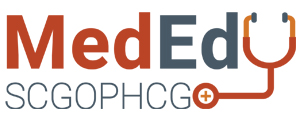Medical Education Unit
Medical Education (MedEd) is responsible for overseeing the education and training of doctors at all levels from students through to consultants. We recognise the positive impact an active educational program has on the quality of patient care and patient outcomes. Our aim is to improve training and ensure the quality of our future workforce, and focus on engagement and wellbeing through high quality education, mentorship and support.
MedEd offers a diverse range of learning experiences: short to multi-day sessions; workshops, lectures, observer-ships, on-line packages and more which are delivered in a multidisciplinary environment. Simulation sessions make use of the new Sim Centre in K Block, QEII Medical Centre. Many of the educational sessions are flexibly delivered and can be accessed remotely or watched later. Microsoft Teams is used to organise information, communication and learning across groups.
Sir Charles Gairdner Osborne Park Health Care Group (SCGOPHCG) is located within QEII Medical Centre, adjacent to Perth Children’s Hospital and soon, the replacement for the Women and Newborn hospital. QEII Medical Centre also hosts over forty research and health institutes which offers a unique setting for doctors at all levels to be involved in collaborative learning and research. SCGOPHCG is fully accredited by the Australian Council on Healthcare Standards and as a Primary Employing Health Service, through the Postgraduate Medical Council of Western Australia.
The key areas in which we deliver educational programs are:
Medical Students and Foreign Graduates
SCGOPHCG welcomes students from three local Universities (Curtin University, Notre Dame University and the University of Western Australia) and works with them to deliver a challenging and rich clinical experience. Clinical learning is complemented by hospital organised tutorials open to all students and a monthly mini-POW WOW, a confidential environment where students are encouraged to reflect on experiences and discuss challenging medical and ethical scenarios. In collaboration with Charlie’s RMO Society, we run SHARE, a program of JMOs teaching students.
Students from elsewhere are welcome to apply for Electives either directly with us or through one of the Universities, acknowledging COVID restrictions have made these more difficult.
A small number of 3-6 month Observer-ships are available for overseas trained doctors seeking APHRA registration who require local clinical experience.
Junior Doctors
Most learning occurs while working clinically and we focus on excellent supervision, provision of feedback and support of doctors.
A range of clinical rotations are available in addition to Perth based positions including rural locations (with up to 5 interns and residents based at any site), in a General Practice in Albany along with new rotations for 2022 at Perth Children’s Hospital and King Edward Memorial Hospital for Women.
An initiative establishing Charlies and Osborne Park Research and Education (CORE) Clubs in the areas of Medicine, Surgery, General Practice, Specialties and Research, and Critical Care allows all junior doctors to explore and develop their careers across a wide range of disciplinary areas, through education, mentorship, Professional Development and Learning (PDL) electives and provision of training information. A new Basic Surgical Stream offers the chance for junior doctors to improve their competitiveness to get onto surgical training programs.
Wellbeing and a manageable workload go hand in hand with a good educational experience. Modifications to rostering, term choice, leave and pay, combined with open communication and regular Town Halls between junior doctors and the Executive team ensure ongoing improvement.
Vocational Trainees
SCGOPHCG has a high rate of success in training in many specialty programs and with high quality care and State-wide services, such as State Head Injury Unit and Neurological Intervention and Imaging Service WA and neurosurgery it is a competitive site for training. Specific programs exist for basic and vocational trainees in various disciplinary areas and the hospital aims to provide relevant clinical rotations, and support and leave around exams. Research is encouraged and trainees can access research training and develop or join projects through the Sir Charles Gairdner Hospital - Department of Research.
Consultants
Consultants are often time poor, may work part time at the hospital and have competing demands to attend Departmental or external education events. Weekly Grand Rounds are pitched at senior staff, aiming to use experts in topical and new areas to explore relevance for our institutions. Professional development opportunities are provided and advertised through Consultant Teams.
Observerships
SCGOPHCG welcomes clinicians, academics, and students to join the hospitals in educational activities. These unremunerated positions are open to those working in Australia or elsewhere in the world and include clinicians wanting to upskill in particular areas, international medical graduates requiring clinical experience, medical students, scientists exploring the clinical context of their research and high school or University students exploring health care careers.
These positions have clear requirements and are closely monitored to ensure patient safety, to avoid excess load in a busy clinical setting and ensure social distancing as part of Covid-19 restrictions is possible in the hospital environment.
Observerships and Professional Development Leave are different, so use the following diagram to guide your application.



